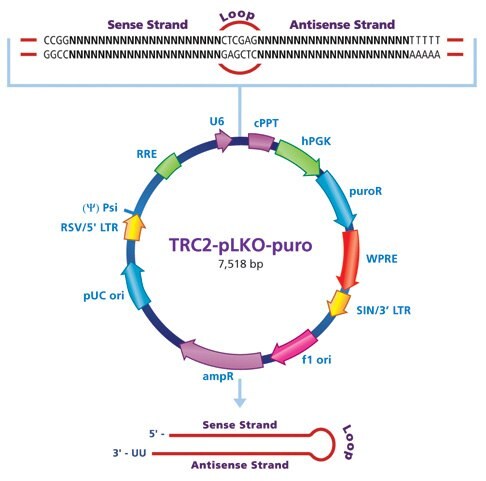Vector Maps
The MISSION research and development team, in collaboration with the RNAi Consortium (TRC) scientists, has generated a series of vectors to enable the successful implementation of your RNAi experiments. The base vector pLKO.1-puro was developed1 at the Broad Institute as part of TRC. Our contribution to TRC is a diverse set of vectors for critical control experiments, as well as vectors for custom shRNA production. This page contains information pertaining to these vectors.
pLKO.1-puro sequence (without shRNA insert)
TRC1.5 Vector: pLKO.1-puro
TRC1.5 Control Vectors
TRC1.5 Alternate Vector Backbones
TRC2 Vector: TRC2-pLKO-puro
Inducible shRNA Vectors
Lentiviral Packaging Vectors
References
TRC1.5 Vector: pLKO.1-puro Vector and Use
TRC1.5 clones are in the exact same vector backbone as the TRC1 clones
Features of the pLKO.1-puro vector allow for transient or stable transfection of the shRNA as well as production of lentiviral particles.1 Stable gene silencing is selected using the puromycin selectable marker while self-inactivating replication incompetent viral particles can be produced in packaging cells (HEK293T) by co-transfection with compatible packaging plasmids.2,3 Exclusive to our portfolio, TRC1.5 contains almost 200,000 clones including more than 49,000 validated clones. It combines all of the content from TRC1 plus an additional 39,212 clones targeting 2,661 new human genes and 2,395 mouse genes. Unlike adenovirus or murine-based MMLV or MSCV retroviral systems, lentiviral-based particles permit efficient infection and integration of the specific shRNA construct into differentiated and non-dividing cells, such as neurons and dendritic cells, overcoming low transfection and integration difficulties when using these cell lines. Compared to siRNA and other vector-based systems, pLKO.1-puro provides solutions for long-term knockdown and phenotypic observation, transduction of difficult or sensitive cell lines (non-dividing cells or primary cells), and is an economical renewable resource.
With an shRNA insert, the length of the pLKO.1-puro plasmid is 7,086 bp, as indicated in the vector map below. Without an shRNA insert, pLKO.1-puro vector has a length of 7,052 bp. The sequence file provided is the empty pLKO.1-puro vector (7,052 bp).

TRC1.5 Vector Description and Features
TRC1.5 Alternate Vector Backbones
We offer a variety of alternate vector backbones as part of our standard shRNA offering. With our customizable MISSION shRNA ordering interface, it is possible to order TRC shRNAs in these vector backbones directly online on the clones detail pages for Plasmid DNA or Lentiviral Transduction Particles. For custom hairpins, please visit our custom cloning page for details on ordering.
We also offer several alternate vector backbones with fluorescent proteins or the UbC promoter. These constructs are available only as custom options. Please visit our custom cloning page for details on ordering.
TRC2 Vector: TRC2-pLKO-puro Vector and Use
The TRC2-pLKO-puro vector also allows for transient or stable transfection of the shRNA as well as the production of lentiviral particles. The only change between the TRC1.5 vector and the TRC2 vector is the addition of the WPRE (or the Woodchuck Hepatitis Post-Transcriptional Regulatory Element).4 This allows for enhanced expression of transgenes delivered by lentivirus.5 As with TRC1.5, stable gene silencing is achieved by using the puromycin selectable marker. Self-inactivating replication incompetent viral particles can be produced in packaging cells (HEK293T) by co-transfection with compatible packaging plasmids. TRC2-pLKO-puro provides solutions for stable long-term knockdown and phenotypic observation, transduction of difficult or sensitive cell lines (non-dividing cells or primary cells), and enhanced expression of transgenes.
With an shRNA insert, the length of the TRC2-pLKO-puro plasmid is 7,518 bp, as indicated in the vector map below. Without an shRNA insert, the TRC2-pLKO-puro vector has a length of 7,484 bp. The sequence file provided is the empty TRC2-pLKO-puro vector (7,484 bp).
TRC2-pLKO-puro sequence (without shRNA insert)
TRC2 Vector Map (TRC2-pLKO-puro)

Please note: At this time, there are no alternate vector backbones available for TRC2.
Inducible shRNA Vectors
The pLKO vector has been redesigned to contain a LacI (repressor) and a modified human U6 shRNA promoter with LacO (operator) sequences. In the absence of IPTG (isopropyl-β-D-thio-galactoside), an analogue of lactose, LacI binds to LacO preventing expression of the shRNA. When IPTG is present, the allosteric LacI repressor changes conformation, releasing itself from lacO modified human U6 promoter, and subsequently allows expression of the shRNA.
We are proud to offer two different IPTG inducible vectors for your research. The preferred inducible vector, pLKO-puro-IPTG-3xLacO, contains three lac operon sequences (two in the U6 promoter and one 3' of the promoter) affording both tight regulation and great gene silencing. Whereas, the pLKO-puro-IPTG-1xLacO vector contains a single lac operon sequence in the U6 promoter, which allows for an advantage to shRNA expression, but looser control of the promoter when not induced.
References
Contact Us
For questions about the library, pricing and quotes or other concerns, please e-mail us at: MISSIONRNAi@sial.com.

如要继续阅读,请登录或创建帐户。
暂无帐户?